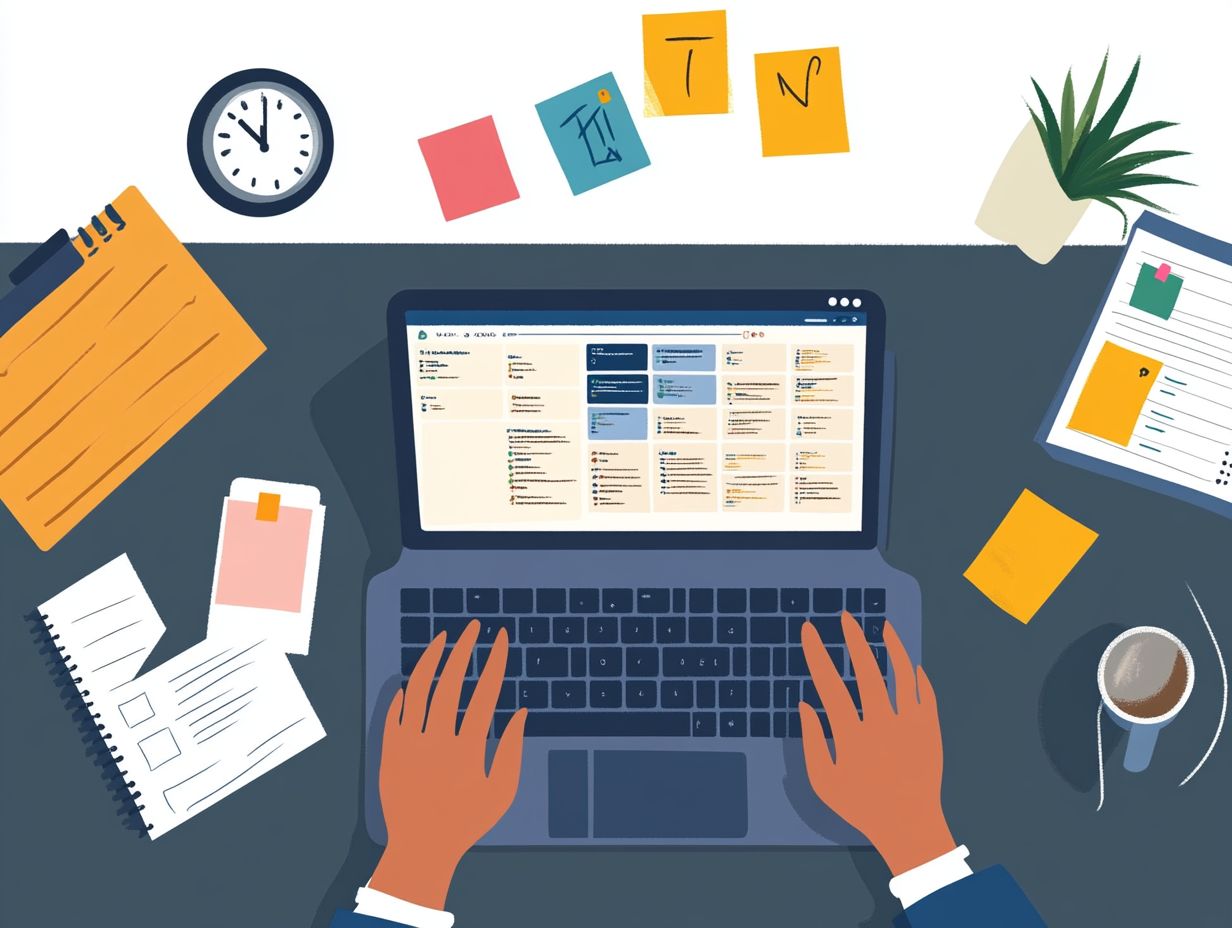How to Use Project Management Tools Against Procrastination
Procrastination can serve as a formidable obstacle in both personal and professional arenas. It often results in unnecessary stress and missed deadlines.
Project management tools provide a structured approach to counteract this tendency. With these tools, you can significantly enhance productivity and improve organization. You will also cultivate a sense of accountability. By integrating them into your daily routine, you ll find practical ways to stay motivated and maintain focus.
Are you ready to take charge of your time and tasks? Let’s dive in and transform your productivity!
Contents
- Key Takeaways:
- Benefits of Using Project Management Tools Against Procrastination
- How to Incorporate Project Management Tools into Daily Routine
- Tips for Maintaining Consistency and Motivation
- Frequently Asked Questions
- What are some project management tools that can help me overcome procrastination?
- How can I use project management tools to create a structured schedule and stick to it?
- Can project management tools help me prioritize my tasks and avoid procrastination?
- How can I use project management tools to track my progress and stay motivated?
- Are there any specific project management techniques I can use to overcome procrastination?
- How can project management tools help me collaborate with others and prevent procrastination?
Key Takeaways:

- Project management tools help increase productivity and manage time more effectively, reducing the tendency to procrastinate.
- Utilizing project management features such as task prioritization and organization can improve accountability and reduce procrastination.
- To maintain consistency and motivation, set realistic goals and rewards. Have strategies in place for dealing with setbacks and staying on track.
Understanding Procrastination and Its Effects
Understanding procrastination and its impacts is essential if you’re looking to enhance your time management skills and boost personal productivity. This habit often arises from emotional factors like task aversion and negative beliefs.
These factors can create a cycle of demotivation. By recognizing these patterns, you can open the door to effective strategies that help you combat procrastination. Breaking tasks into smaller steps and setting specific goals can enable you to cultivate self-regulation.
Psychological elements, such as dopamine regulation, play a significant role in this behavior. Your brain’s reward system often craves immediate gratification.
This craving prioritizes short-term pleasure over long-term benefits. This is especially true in cases of perfectionism, where the fear of falling short of high standards can leave you feeling paralyzed.
Incorporating techniques like the Pomodoro Technique, where you work for a set time (like 25 minutes) and then take a short break, can help you engage in focused bursts of work. This gives you a sense of accomplishment.
Embracing self-compassion will help ease the emotional strain of setbacks. Actively seeking support from peers can create a motivational atmosphere that fosters a more productive approach to your tasks.
Overview of Project Management Tools
Project management tools like ClickUp and Asana are critical for elevating your organization, productivity, and team collaboration. These platforms enable you to track project progress effectively, ensuring that every detail is accounted for.
With a range of features at your fingertips, you can prioritize tasks and monitor milestones. You will manage projects with clarity and accountability, all aimed at achieving your team s objectives.
Incorporating advanced functionalities like task breakdowns and visualizations allows you to deconstruct large projects into manageable tasks. This level of granularity can be a game-changer.
It helps you combat procrastination and fosters a sense of accomplishment with every task you complete. Intuitive dashboards and Gantt charts provide excellent time-blocking capabilities, allowing you to allocate your hours more efficiently.
With handy reminders and automated workflows, distractions are minimized, and your focus sharpens. This drives successful project execution and nurtures a culture of accountability.
As a result, you can streamline your processes, leading to improved outcomes and a notable reduction in overwhelm.
Benefits of Using Project Management Tools Against Procrastination
Utilizing project management tools can dramatically mitigate procrastination, showing you how to use time management tools to stop procrastination. This elevates your productivity and refines your time management strategies.
These tools offer clarity by breaking down tasks into manageable segments. They also enhance collaboration among your team members. This makes the path to project success not just achievable, but truly attainable.
Increased Productivity and Time Management

Increased productivity and time management stand out as some of the most significant advantages of using project management tools, enabling you to manage your tasks and deadlines with finesse.
By adopting strategies like time blocking a method where you allocate specific blocks of time for tasks and the Pomodoro Technique, which involves working for 25 minutes followed by a short break, you can enhance your self-regulation and sharpen your focus on completing those tasks.
These tools often include features that allow you to prioritize tasks, set clear objectives, and organize your workflow with ease. This structured approach fosters accountability and encourages meaningful behavior change by promoting consistency.
As you track your progress and celebrate those small victories, positive reinforcement transforms into a powerful motivator, enhancing your emotional well-being.
The outcomes are clear: you ll notice a marked reduction in procrastination as you become more motivated to complete tasks on time, ultimately cultivating a more fulfilling and less overwhelming work environment.
Improved Organization and Accountability
Improved organization and accountability are invaluable advantages that project management tools bring to your team, allowing you to visualize tasks and track progress effortlessly.
With real-time feedback and clear task breakdowns at your fingertips, you can ensure that everyone is aligned with specific goals and project timelines.
This clarity in communication creates a collaborative atmosphere where team members can freely share insights and address concerns, breaking down the usual barriers.
By establishing a daily routine that incorporates regular check-ins and feedback sessions, you enhance individual performance while simultaneously strengthening team dynamics.
Structured updates encourage everyone to take responsibility for their tasks. Ultimately, these tools do more than just manage projects; they create a transparent environment and promote continuous improvement, ensuring that everyone is aligned and working towards collective success.
How to Incorporate Project Management Tools into Daily Routine
Ready to supercharge your productivity? Let’s dive into practical strategies! Incorporating project management tools into your daily routine can significantly elevate your productivity and minimize the temptation to procrastinate. Additionally, learning how to use visualization to overcome procrastination can further enhance your focus and efficiency.
By establishing a structured method for task prioritization and efficient time tracking, you can seamlessly weave these tools into your workflow, transforming the way you manage your tasks and achieve your goals.
Identifying and Prioritizing Tasks
Identifying and prioritizing your tasks is essential for mastering time management and overcoming procrastination. Utilizing tools for tracking your progress against procrastination can be your allies in this endeavor.
By providing clarity in goal management, these tools help you differentiate between what s urgent and what can wait a little longer.
To elevate your productivity, consider employing a simple task prioritization method that categorizes your tasks into four quadrants based on urgency and importance, ensuring you concentrate on what truly matters.
Incorporating SMART goals Specific, Measurable, Achievable, Relevant, and Time-bound offers a structured approach to completing your tasks. Breaking larger projects into smaller, manageable steps not only makes them less intimidating but also fosters a consistent sense of accomplishment.
To further enhance your motivation, think about implementing a rewards system for completing tasks. Start using a rewards system today to boost your motivation and cultivate a positive mindset throughout your journey.
Utilizing Features of Project Management Tools

To truly maximize the benefits of project management tools, you must understand and effectively utilize their features, such as time blocking and feedback mechanisms. These functionalities will turbocharge your organization and keep your projects on track.
By leveraging the task breakdown capabilities offered by platforms like ClickUp and Asana, you can better allocate resources and set clear deadlines. These tools often incorporate elements of understanding emotions, recognizing how stress and motivation levels can impact performance.
Using techniques like the Pomodoro Technique can improve your focus. It allows your team to work in concentrated bursts followed by brief breaks. This structured approach fosters accountability and nurtures a more positive work environment, ultimately driving your productivity to new heights.
Tips for Maintaining Consistency and Motivation
Maintaining consistency and motivation is crucial for overcoming procrastination and achieving your goals. To facilitate this process, employ several effective strategies. For instance, learning how to use a timer to combat procrastination can enhance your self-regulation and elevate your overall productivity, guiding you toward successful task completion with greater ease.
Setting Realistic Goals and Rewards
Setting realistic goals and implementing rewards can significantly elevate your motivation and help you combat procrastination. Acknowledging your achievements, no matter how small, cultivates a sense of self-compassion that enhances your overall productivity.
This approach aligns beautifully with the SMART framework. SMART goals are Specific, Measurable, Achievable, Relevant, and Time-bound. Such a structure provides clearer pathways to success, reducing task aversion as you visualize attainable milestones ahead.
Emotional factors like fear of failure or perfectionism often act as roadblocks to your progress. Integrating rewards for each completed step is essential. Celebrating even minor victories reinforces your positive behavior and fosters resilience, enabling you to push through emotional barriers and remain focused on your objectives.
Dealing with Setbacks and Staying on Track
Dealing with setbacks and keeping yourself on track is often challenging, especially when procrastination rears its head. However, with effective strategies in place, you can confidently navigate these obstacles. Regular feedback and self-reflection will help you understand the emotional factors at play while reinforcing your motivation.
Incorporating self-regulation techniques is essential, as they enable you to manage your emotions and behaviors more effectively. By breaking down larger goals into manageable steps, you can sidestep overwhelming feelings and maintain focus. Regular communication with your team fosters a collaborative environment that encourages accountability and shared responsibility.
This approach boosts your motivation and creates opportunities for exchanging valuable insights and receiving support. By acknowledging the cognitive factors influencing your behavior change, you can cultivate resilience and a proactive mindset, leading to more consistent progress even when challenges inevitably arise.
Frequently Asked Questions

-
What are some project management tools that can help me overcome procrastination?
Some popular project management tools include Trello, Asana, and Monday.com. These tools can help you stay organized and on track with your tasks, making it easier to combat procrastination effectively.
-
How can I use project management tools to create a structured schedule and stick to it?
Project management tools allow you to break down large tasks into smaller, manageable ones and assign deadlines to them. This helps you create a structured schedule and stay accountable for completing each task on time.
Start using project management tools today to combat procrastination and achieve your goals!
Can project management tools help me prioritize my tasks and avoid procrastination?
Yes, project management tools can help you prioritize tasks. They have features like task priority and due dates, which help you focus on what s important and beat procrastination.
How can I use project management tools to track my progress and stay motivated?
Project management tools let you track your progress easily. Mark tasks as complete and see how far you ve come. This motivates you to keep pushing forward!
Are there any specific project management techniques I can use to overcome procrastination?
One effective technique is the Pomodoro method. This involves breaking your work into 25-minute intervals with short breaks in between. Try it out to see how much you can accomplish! It helps you stay focused and avoid procrastination by giving you a clear time limit for each task.
How can project management tools help me collaborate with others and prevent procrastination?
Many project management tools have features for team collaboration. You can assign tasks to specific team members and track their progress. Working together creates a sense of urgency to meet deadlines and prevents procrastination by promoting accountability.






